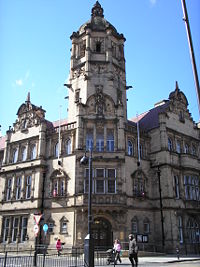West Yorkshire County Council
|
West Yorkshire County Council West Yorkshire Metropolitan County Council |
|
|---|---|
| West Yorkshire | |

Coat of arms of the West Yorkshire County Council
|
|
| Type | |
| Type | |
| History | |
| Established | 1 April 1974 |
| Disbanded | 31 March 1986 |
| Preceded by | Various authorities, including West Riding County Council |
| Succeeded by | Various agencies, including West Yorkshire Joint Services |
| Seats | 88 |
| Elections | |
|
Last election
|
1973 |
|
Last election
|
1977 |
|
Last general election
|
1981 |
| Meeting place | |
 |
|
| County Hall, Wakefield, England | |
West Yorkshire County Council (WYCC) — also known as West Yorkshire Metropolitan County Council (WYMCC) — was the top-tier local government administrative body for West Yorkshire from 1974 to 1986. A strategic authority, with responsibilities for public transport, planning, emergency services and waste disposal, it was composed of 88 members drawn from the five metropolitan boroughs of West Yorkshire. West Yorkshire County Council shared power with five lower-tier district councils, each of which directed local matters.
Established with reference to the Local Government Act 1972, elections in 1973 brought about the county council's launch as a shadow authority, several months before West Yorkshire (its zone of influence) was officially created on 1 April 1974. The West Yorkshire County Council operated from County Hall, Wakefield, until it was abolished 31 March 1986, following the Local Government Act 1985. Its powers were passed to the five district councils of West Yorkshire (which had shared power with WYCC): City of Bradford Metropolitan District Council, Calderdale Council, Kirklees Council, Leeds City Council and Wakefield Metropolitan District Council. Some powers of the county council were restored when the district councils delegated strategic responsibilities (such as emergency services and public transport) to the county-wide West Yorkshire Joint Services and joint boards.
Its headquarters were County Hall in Wakefield. This was built in 1888 for West Riding County Council, which occupied it until its abolition in 1974. The building is now the home of Wakefield Metropolitan District Council.
...
Wikipedia
